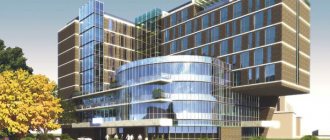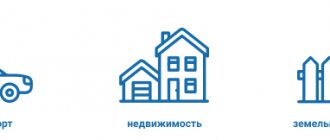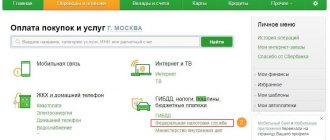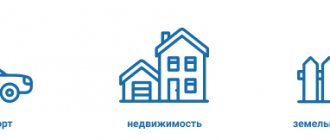When does the tax exemption apply?
According to the general rule, individual entrepreneurs on the simplified tax system and a patent are indeed exempt from property tax that is used in business - clause 3 of Art. 346.11, paragraph 10 of Art. 346.43 Tax Code of the Russian Federation. Unified Agricultural Tax payers too, but with nuances that we will not talk about in this article - clause 3 of Art. 346.1 Tax Code of the Russian Federation.
!
But there is an exception: the exemption does not apply if the tax is calculated at the cadastral value. Each region compiles a list of similar objects - premises for offices, retail outlets and consumer services - clause 7 of Art. 378.2 Tax Code of the Russian Federation. If you own non-residential premises, be sure to check it in the local list.
It happens that the premises are used as a warehouse, for production or as a garage, but suddenly it turns out to be on the list of retail and office premises - obviously by mistake. If the individual entrepreneur does not agree, he can go to court.
The Moscow government included the premises in the list, but the owner did not agree and went to court. The court found that the disputed building is not intended to accommodate retail facilities, catering facilities or consumer services - it is intended to accommodate garages and parking lots. The list item was declared invalid.
Case No. N 5-APA19-185
Sometimes the premises are not included in the list, but the building in which it is located is included. In this case, the individual entrepreneur will also not receive tax exemption.
The inspectorate denied an individual entrepreneur using the simplified tax system an exemption from property tax. The individual entrepreneur went to court, where he stated that the premises were not on the list, so he had the right to a benefit. The court said: but the building is included in the list, and the legality of its inclusion in the list must be contested separately.
Case No. A27-29802/2018
And, of course, for objects that are not used in business, the entrepreneur must pay tax as usual. For example, you cannot use the benefit to stop paying tax on your apartment.
Results
Starting from 01/01/2015, individual entrepreneurs on a simplified basis for some objects acquired the obligation to pay property tax based on the cadastral value. The calculation of such tax is carried out by the Federal Tax Service. Until 2015, an individual entrepreneur was burdened with property tax only if he worked for OSNO, and the use of any of the special regimes allowed him not to pay this tax.
You can find more complete information on the topic in ConsultantPlus. Free trial access to the system for 2 days.
How to get exemption
In the latest clarifications, the tax service said that if the individual entrepreneur does not submit an application for a benefit, then the inspectorate can provide it without an application, based on the information it has - clause 6 of Art. 407 of the Tax Code of the Russian Federation, Letter of the Federal Tax Service of Russia dated May 11, 2021 No. BS-4-21/ [email protected]
But what if the tax office does not receive information from the register or doubts that the property is used in business? We advise you to play it safe and do as before: send an application with supporting documents to the inspectorate. These could be documents in which the premises appear as a place of acceptance and release of goods or employment contracts in which the employee’s place of work is indicated - Letter of the Ministry of Finance of Russia dated April 26, 2018 N 03-05-06-01/28324.
At the request of the individual entrepreneur, the inspectorate can recalculate the tax for previous periods. Recalculation can be made no more than 3 years preceding the year of application and no earlier than the date when the individual entrepreneur became entitled to the benefit - Letter of the Federal Tax Service of Russia dated 01.06.2020 No. BS-4-21 / [email protected] That is, in 2021 An individual entrepreneur may request a tax refund for 2021, 2021 and 2021.
If the individual entrepreneur rents out an apartment
An individual entrepreneur can rent out an apartment both as an individual and as an entrepreneur.
In the first case, you will have to pay 13% personal income tax on income from renting an apartment and there will be no exemption from property tax. In order for the inspection to regard the rental of an apartment as a business activity, the individual entrepreneur must have OKVED code 68.20.1 “Rent and management of own or leased residential real estate” - Letter of the Ministry of Finance of Russia dated December 19, 2011 N 03-11-11/318.
If you rent out an apartment as an individual entrepreneur, you can take advantage of the exemption. To do this, we advise you to provide the inspection with documents that confirm that the apartment is used in business, for example, a lease agreement and receipts for receipt of rent - Letter of the Federal Tax Service of Russia dated 04/06/2020 No. BS-4-21/ [email protected]
!
When choosing between two options, it is important to consider the nuance. When receiving an exemption from property tax, entrepreneurs lose the right to exemption from personal income tax when selling an apartment. These two benefits are incompatible.
The entrepreneur will have to multiply all income received from the sale by his regular rate, and if he closes the business, by 13% personal income tax. After the business is closed, the benefit will not return: the tax authorities will consider it an unjustified tax benefit.
NTVP "Kedr - Consultant"
LLC "NTVP "Kedr - Consultant" » Services » Consultations of auditors » If an individual is registered as an individual entrepreneur, then income from the rental of non-residential premises is taken into account as income when determining the tax base for the tax paid in connection with the application of the simplified tax system
Question: An individual (individual entrepreneur is not registered) leased non-residential premises to a legal entity for a store. A legal entity sits on UTII and pays all taxes on its own, while an individual received a tax for this premises. And this premises was classified as a residential building, although as a premises it is non-residential and it is leased for use in business activities. Please explain how an individual can pay taxes in this situation, and whether the tax office is right when it taxes non-residential premises as a residential building. And also an individual and the head of an organization are one person.
Zarya audit specialists answer: 1. According to Art. 1 of the Law of the Russian Federation of December 9, 1991 N 2003-I “On taxes on property of individuals” 1. Payers of taxes on property of individuals (hereinafter referred to as taxes) are recognized as individuals - owners of property recognized as the object of taxation.
According to Art. 2 of this Law, the following types of property are recognized as objects of taxation:
- House;
- apartment;
- room;
- country house;
- garage;
- other building, premises and structures;
- share in the right of common ownership of the property specified in paragraphs 1 - 6 of Article 2 of the Law.
In accordance with the decision of the City Duma of Izhevsk dated November 26, 2010 N 38 (as amended on November 17, 2011), from January 1, 2012, the following rates of property tax for individuals were established depending on the total inventory value of taxable objects :
- residential building - 0.1 - 0.31%;
- other buildings, premises and structures - 0.1 - 1.2%.
In this situation, an individual is the payer of personal property tax, which is paid by the owner of the property.
2. In accordance with paragraph 1 of Article 226 of the Code, Russian organizations from which or as a result of relations with which the taxpayer received income specified in paragraph 2 of the said article of the Code are required to calculate, withhold from the taxpayer and pay the amount of tax calculated in accordance with Article 224 Code. These organizations are tax agents.
According to paragraph 2 of Article 226 of the Code, the calculation of amounts and payment of tax in accordance with this article of the Code are carried out in relation to all income of the taxpayer, the source of which is a tax agent, with the exception of income in respect of which the calculation and payment of tax are carried out in accordance with Articles 214.1, 227, 227.1 and 228 of the Code.
A Russian organization that pays rent to an individual for premises rented from him is recognized as a tax agent in relation to such income of the individual and, accordingly, must fulfill the obligations of calculating, withholding and transferring to the budget personal income tax in the manner prescribed by Article 226 of the Code .
At the same time, in accordance with paragraph 5 of Article 3 of the Code, no one can be assigned the obligation to pay taxes and fees, as well as other contributions and payments that have the characteristics of taxes or fees established by the Code, are not provided for by the Code or are established in a manner other than that specified Code. An additional agreement to a contract in which tax payment obligations are assigned to the taxpayer will be void. (Letter of the Department of Tax and Customs Tariff Policy of the Ministry of Finance of the Russian Federation dated July 15, 2010 N 03-04-06/3-148)K
In addition, it should be noted that although for individuals participating in rental relations and (or) transactions for the purchase and sale of property owned by them, there is no obligation to obtain the status of an individual entrepreneur, and the income received by individuals from renting out rental (lease) and (or) sale of movable or immovable property are specified in Article 208 of the Tax Code of the Russian Federation as an independent type of income that is subject to personal income tax taxation; in accordance with paragraph 1 of Article 23 of the Civil Code of the Russian Federation, a citizen has the right to engage in entrepreneurial activity without forming a legal entity from the moment of state registration as an individual entrepreneur.
In accordance with the provisions of civil legislation, entrepreneurial activity is an independent activity carried out at one’s own risk, aimed at systematically obtaining profit (income) from the use of property, sale of goods, performance of work or provision of services by persons registered in this capacity in the prescribed manner.
The presence of signs of entrepreneurial activity in a citizen’s actions is evidenced, in particular, by the following facts:
- production or acquisition of property for the purpose of subsequent profit from its use or sale;
- accounting of business transactions related to transactions;
- the interconnectedness of all transactions made by a citizen in a certain period of time;
- stable relationships with sellers, buyers, and other counterparties.
Economic activity takes place when resources, equipment, labor, technology, raw materials, materials, energy (information resources) are combined into a production process, the purpose of which is the production of products (provision of services).
Economic activity is characterized by production costs, the production process and the output of products (provision of services). This is stated in the All-Russian Classifier of Types of Economic Activities OK 029-2001 (NACE Rev. 1), approved by Resolution of the State Standard of Russia dated November 6, 2001 N 454-st.
If all the above characteristics are present, an individual is required to register as an entrepreneur without forming a legal entity.
Thus, if operations for leasing (renting) property or operations for buying and selling property are carried out in the presence of signs of economic and entrepreneurial activity, an individual is obliged to register as an entrepreneur without forming a legal entity. In this case, the individual will be required to pay tax on the relevant income as an individual entrepreneur.
If there are no grounds for recognizing transactions with real estate as entrepreneurial activity, an individual must pay personal income tax on the income received as a person who is not an individual entrepreneur.
Recommendations:
1. Regarding property tax: individual entrepreneurs who apply the simplified taxation system and are the owners of property used to carry out their business activities are not payers of property tax for individuals (in relation to such property). In relation to other property, these individual entrepreneurs are recognized as payers of property tax for individuals on a general basis.
Based on the totality of the provisions of the Tax Code and Law N 2003-1, in order to confirm the right to exemption from payment of property tax for individuals, individual entrepreneurs submit to the tax authorities an application in any form for exemption from payment of this tax in relation to the real estate indicated in the application.
In addition, it is necessary to submit documents to the tax authorities confirming the fact of using real estate for business activities.
Documents confirming the leasing of non-residential premises are lease agreements with tenants, payment documents indicating the receipt of income from this type of activity, and any other documents confirming the use of property for business activities during the period of application of the simplified taxation system. Similar explanations are given in letters of the Ministry of Finance of Russia dated January 18, 2010 N 03-11-11/1 and dated February 1, 2010 N 03-05-04-01/06.
If the right to a benefit arises during a calendar year, the tax is recalculated.
Thus, in accordance with paragraph 3 of Article 346.11 of the Code, the use of a simplified taxation system by individual entrepreneurs provides for the replacement of the payment of a number of taxes, including the property tax of individuals (in relation to property used for business activities).
2. For personal income tax: in accordance with paragraph 1 of Article 346.15 of the Tax Code of the Russian Federation, individual entrepreneur taxpayers applying the simplified taxation system, when determining the object of taxation, take into account sales income, determined in accordance with Article 249 of the Code, and non-operating income, determined in accordance with with Article 250 of the Code. When determining the object of taxation, income provided for in Article 251 of the Code is not taken into account.
Thus, if an individual is registered as an individual entrepreneur and in accordance with the requirements of the Federal Law of 08.08.2001 N 129-FZ “On State Registration of Legal Entities and Individual Entrepreneurs”, the type of economic activity such as renting is indicated in the Unified State Register of Individual Entrepreneurs rental of own non-residential real estate (code 70.20.2 of section “K” of the All-Russian Classifier of Types of Economic Activities (OKVED), approved by Decree of the State Standard of Russia dated November 6, 2001 N 454-st.), then income from the rental of non-residential premises received by such a taxpayer , are taken into account as part of income when determining the tax base for taxes paid in connection with the application of a simplified taxation system (for example, income at a rate of 6%).
If the individual entrepreneur does not temporarily use the premises in business
Individual entrepreneurs have periods when property is not used in business. For example, the old lease has expired, but a new one has not yet been concluded, or the premises are being renovated.
The property tax exemption will still apply. Because entrepreneurial activity includes not only generating income, but also the entire preparatory process: repairs, hiring new employees and searching for contractors. Although it is advisable to save documents for repair work, in case the tax office becomes interested in the reasons for the downtime and reduction in the taxable base of your business - Letter of the Ministry of Finance of the Russian Federation dated May 12, 2014 No. 03-11-11/22083.








